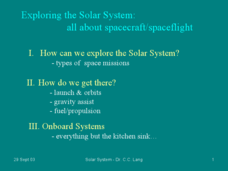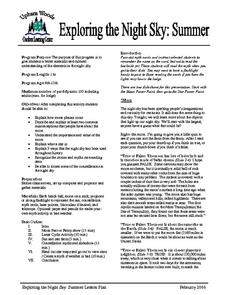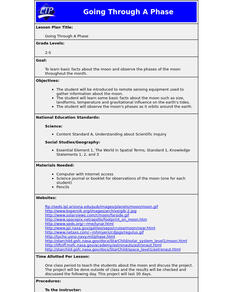Curated OER
Astronomy and Me: Moons Over New Haven
Third graders study the features of different moons orbiting the planets. In this astronomy lesson, 3rd graders explore the different phases of the moon using an interactive online website. They compare and contrast the features of the...
Curated OER
Fact or Hoax? You Decide.
Students analyze the components of debating and practice what they have learned as they conduct a class debate on the lunar landing. Both sides of the issue are researched and presented to the group.
Curated OER
Flight of the Future/Space Flight
Students explore space science by viewing videos on YouTube. In this moon landing instructional activity, students view clips of Neil Armstrong taking his first step on the moon and discuss the space race between the U.S. and Russia....
Curated OER
Exploring the Solar System: All About Spacecraft/Spaceflight
Rarely do you find resources that reach high school astronomy learners. Here is something at their level! The physics of flyby missions is explained via several examples. Landing, penetrating, and roving spacecraft are examined. Diagrams...
Curated OER
Loggerhead Turtle Fun Facts
Students study loggerhead turtles and learn facts about reptiles. In this turtles lesson, students read information about loggerhead turtles and study their various sections and characteristics. Students then make their own sea turtle.
Curated OER
Exploring the Night Sky: Summer
Students explain how moon phases occur. They describe and explain at least two common misconceptions that people have about the moon. Students explain what a star is. They explain 3 ways that the night sky has been used throughout history.
Curated OER
Exploring the Hudson in 1609
Learners follow the journey of Henry Hudson down the river with his name. Using journal entries and maps, they learn about its exploration. They use maps to identify stages of the journey, and practice converting distances into miles.
Curated OER
Exploring the Night Sky: Fall/Winter
Students explain how moon phases occur. They explain three ways that the night sky has been used through history. Students locate some of the constellations in the night sky. They discuss stories and myths surrounding stars.
NASA
Packing for a L-o-o-o-ng Trip to Mars
Pack just enough to fit. Crews determine what personal items to take with them on a trip to Mars. Each team must decide what to take with them on a two-and-a-half year trip to Mars and whether their items will fit within the allotted...
Curated OER
Going Through A Phase
Students are introduced to remote sensing equipment used to gather information about the moon. They learn basic facts about the moon such as size, landforms, temperature and gravitational influence on the earth's tides.
American Museum of Natural History
What is Marine Biology?
A marine environment covers the majority of the earth but is arguably the least understood. Teach young scientists about the characteristics of oceans and ocean species using an interactive online lesson. The in-person or remote learning...
Curated OER
Letters to the Man in the Moon
Learners write and communicate mathematically with their classmates. They discuss the mathematics that it took to allow us to conquer space and land on the moon. They sketch a plaque they would leave on the moon.
Curated OER
Importance of American Flag in American Literature
Betsy Ross - fact and myth. As an introduction to American Literature, class members become detectives and search web sites to find information about the flag, prominent places it has been displayed (on the moon, at ground zero, in...
Curated OER
Jupiter - King of the Planets
In this Jupiter learning exercise, students read a passage about the environment and atmosphere of Jupiter. Students then answer several multiple choice questions about the passage.
Curated OER
Unearthing The Facts
Students use agriculture related questions in order to build research skills. The questions are given and then they are expected to determine the best resource for finding the answers. The connection to the farmer is how they use...
Curated OER
Once a fact, always a truth
Young scholars discover there are many sources of accurate and inaccurate information. They use newspapers and, in small groups, develop a statement explaining why they believe the article is accurate or inaccurate.
Curated OER
Exploring the Hudson in 1609
In this geography worksheet, 5th graders study about the exploration of the Hudson River. Students respond to 7 multiple choice questions about the presented facts.
Curated OER
Life Beyond Earth
Students investigate the solar system and what makes a planet habitable. They complete an online Webquest, simulate a NASA training program online, take an online quiz, answer discussion questions, and locate newspaper articles about the...
Curated OER
Planets
In this planets worksheet, learners read about Mercury, Venus, and Earth and then complete 21 multiple choice, 2 true or false, and 1 short answer question.
Curated OER
Apollo 16
Students examine Apollo 16 and its significance. For this Apollo 16 lesson students work in groups, answer questions and complete a worksheet.
Curated OER
Organizing A Persuasive Speech
Have the class listen to a lecture on persuasive speeches. They practice outlining and detailing the components of a persuasive speech. The lecture outline also includes suggestions for researching a topic or thesis, organizing the...
Curated OER
Microbial Influence on Earth's Systems
Students identify the different biogeochemical cycles on Earth. For this biology lesson, students observe microbes under a microscope. They compare and contrast respiration and photosynthesis.
Curated OER
Nouns and Adjectives
In this nouns and adjectives instructional activity, learners recognize nouns and adjectives. Students look at six sentences and pick out the adjectives, nouns used as adjectives, and nouns for each sentence.
Curated OER
Identifying Genre
In this identifying genre worksheet, 9th graders read the titles and descriptions of 15 stories, identify and write the genre and subgenre from the list provided.

























